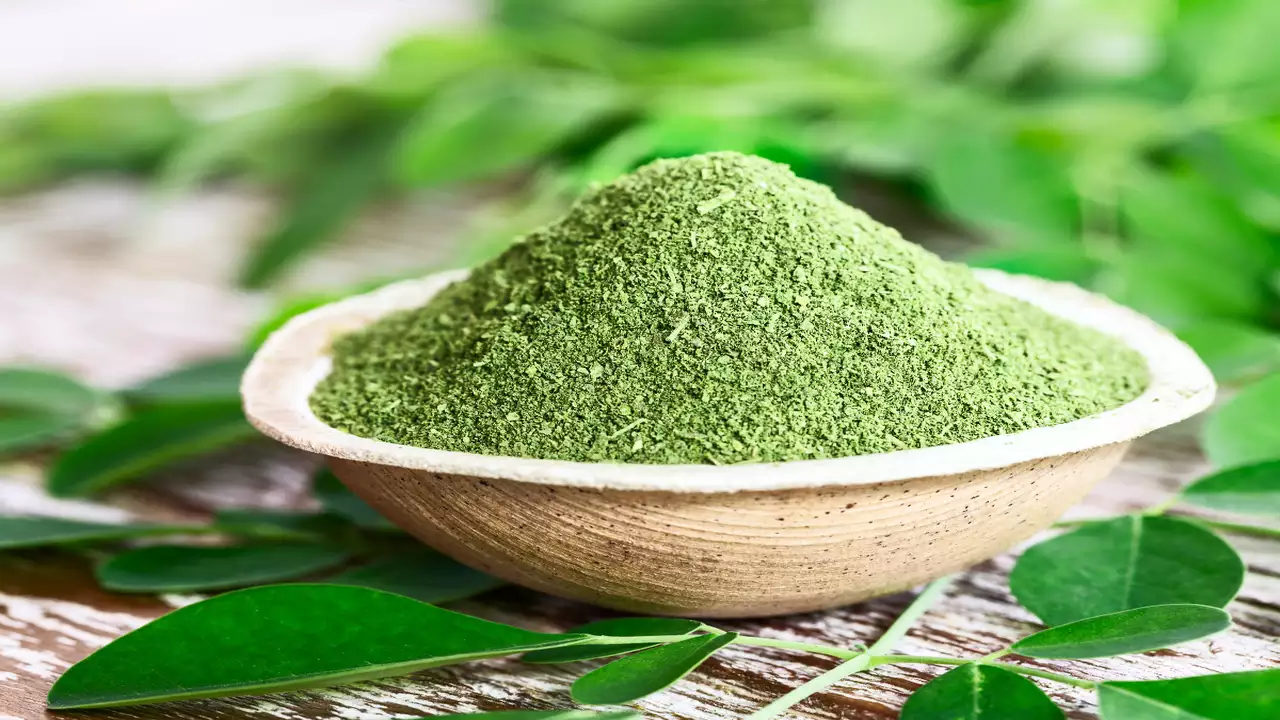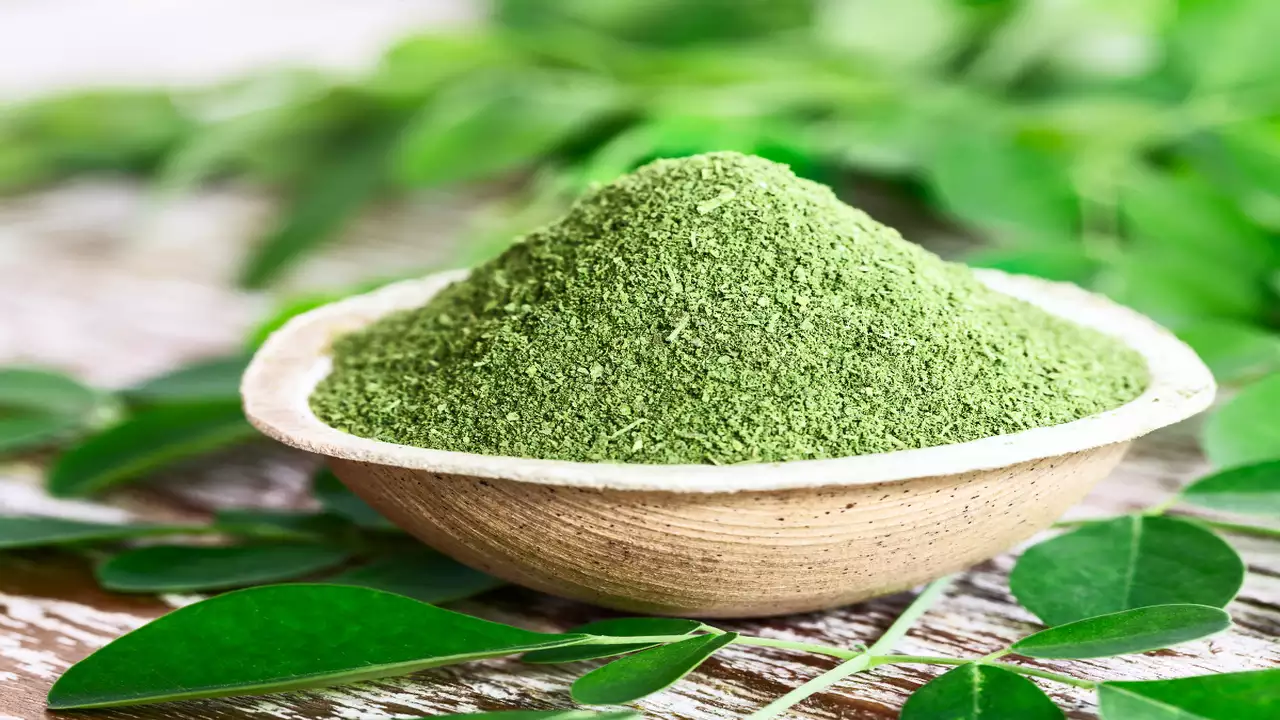Moringa leaves, derived from the Moringa oleifera tree, commonly known as the drumstick tree or the miracle tree, are gaining recognition worldwide for their nutritional benefits and versatile uses. Native to parts of Africa and Asia, moringa is celebrated not only for its ability to thrive in harsh climates but also for its densely packed nutrients that can significantly bolster health.
Nutritional Profile

Moringa Leaves
Moringa leaves are exceptionally rich in vitamins, minerals, and other essential nutrients. They are a great source of vitamins A, C, and E, calcium, potassium, and protein. Compared to common foods often lauded for their vitamin content, moringa leaves have several fold higher concentrations of these nutrients. For instance, moringa has more vitamin C than oranges, more potassium than bananas, and more calcium than milk on a gram-for-gram basis.
Health Benefits
- Antioxidant Effects: Moringa leaves are packed with antioxidants such as quercetin and chlorogenic acid.
- Anti-inflammatory Properties: The leaves have anti-inflammatory properties thanks to isothiocyanates. Chronic inflammation is linked to many health issues, including heart disease, diabetes, and respiratory problems. Regular consumption of moringa can help manage inflammation and maintain general well-being.
- Supporting Brain Health: The high levels of antioxidants and neuro-enhancer activities in moringa leaves are thought to help improve brain health and cognitive functions. They may also have a protective effect against neurodegenerative diseases.
Uses in Cooking and Medicine
Moringa leaves are incredibly versatile in culinary uses. They can be eaten raw, cooked, or dried and powdered to be used as a supplement. In cooking, fresh leaves are often added to salads, blended into smoothies, or steamed like spinach. The dried leaves are commonly ground into a powder that can be sprinkled over meals or mixed into smoothies and juices.
In traditional medicine, moringa has been used for centuries to treat a variety of conditions such as anemia, asthma, joint pain, and many more. Its use in herbal medicine practices around the world underscores its potential as a medicinal food.

Moringa Leaves
Environmental Impact
Moringa not only benefits health but also the environment. The Moringa oleifera tree is drought-resistant, making it an excellent crop for arid regions where food resources are scarce. It grows quickly and has a high yield, which means it provides more nutrients per square foot of land than many other trees.
Moringa leaves offer a multitude of health benefits and are a promising supplement for those looking to enhance their diet. As research continues to uncover the full potential of this “miracle tree.” It becomes clear why moringa is respected as a superfood across various cultures. Whether used in traditional medicine or as a nutritional supplement. Moringa leaves have the potential to make a significant impact on global health and nutrition.
Advantages and Disadvantages of Moringa Leaves
Moringa leaves, derived from the Moringa oleifera tree, often hailed as a “miracle tree,” are well-known for their nutritional benefits and medicinal properties. However, like any natural product, they also jpslot have their drawbacks.

Moringa Leaves
Advantages of Moringa Leaves
- Nutrient-Dense: Moringa leaves are extremely rich in vital nutrients. They contain significant amounts of vitamins A, C, and E, calcium, potassium, and protein. Their rich nutrient profile helps combat malnutrition and is particularly beneficial in regions where access to nutritious food is limited.
- Antioxidant Properties: These leaves are loaded with antioxidants like quercetin, chlorogenic acid, and beta-carotene. Which combat oxidative stress and may reduce inflammation. Regular intake of antioxidants is linked with a reduced risk of chronic diseases such as heart disease, type 2 diabetes, and Alzheimer’s.
- Supports Overall Health: The bioactive compounds in moringa can have beneficial effects on several bodily systems. They help regulate blood sugar levels, reduce inflammation, lower cholesterol, and support brain health.
- Sustainable Crop: Moringa trees are incredibly resilient. They can grow in poor soils and arid climates, require minimal water, and mature quickly, making them a sustainable choice for local agriculture in challenging environments.
Disadvantages of Moringa Leaves
- Potential Side Effects: Despite their health benefits, moringa leaves might cause side effects in some people. Consuming large quantities of moringa leaves can have a laxative effect. They also contain certain compounds that can interfere with medication absorption or exacerbate existing conditions like hypothyroidism.
- Interaction with Medications: Moringa leaves can interact with various medications, including those for diabetes and high blood pressure, due to their ability to alter enzyme activity in the liver. It’s important for individuals on such medications to consult healthcare providers before starting any form of moringa supplementation.
- Contamination Risks: As with many leafy greens, moringa leave are susceptible to contamination from the soil they are grown in, including heavy metals and bacteria. Proper sourcing and handling are essential to minimize these risks.
Conclusion
Moringa leave offer numerous health benefits due to their impressive array of vitamins, minerals, and antioxidants. They are an excellent supplement for improving overall health and nutritional intake, especially in malnutrition-prone areas. However, their potential side effects and interactions with medications mean that they should be consumed with caution. Particularly by those with existing health conditions or those on medication. As with any supplement, it’s advisable to consult with a healthcare provider before integrating moringa leaves into a regular diet.
Read More Article About “Online Business : Strategies for Success in the Digital Marketplace“

